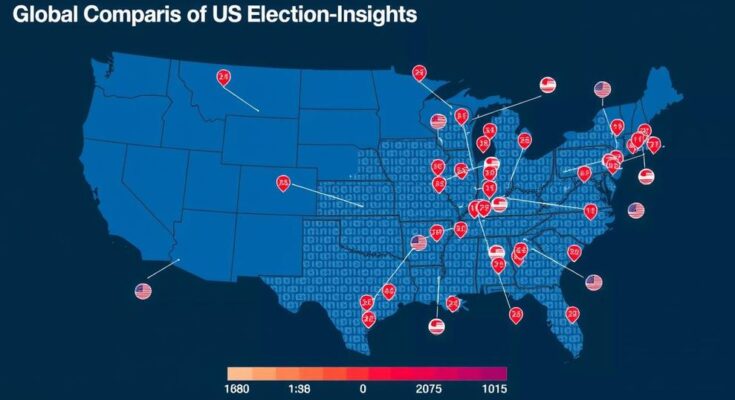The United States, with the largest economy globally and significant military spending, faces challenges of an ageing population, high healthcare costs, and educational disparities. The upcoming election in 2024 will bring these socio-economic issues to the forefront as candidates propose solutions to improve quality of life for American citizens.
The United States stands as the world’s largest economy, boasting a gross domestic product (GDP) of approximately $27 trillion, significantly ahead of its closest competitors, China and Germany. However, the nation faces economic challenges amid an ageing population and declining growth rates. The US ranks seventh globally in GDP per capita, highlighting a disparity between its wealth and overall quality of life. Additionally, it has the highest healthcare costs, spending over $12,000 per capita annually. Other sectors, such as education and military spending, also display the nation’s complex socioeconomic landscape, particularly as voters prepare for the upcoming election. A closer examination reveals that the US federal minimum wage, stagnant since 2009, significantly contributes to the economic strain on citizens. With an average annual income of around $15,080, workers struggle as housing affordability rates soar. This dichotomy between high wages and inflated housing costs necessitates progressive solutions to ensure quality living standards are met. Furthermore, while US healthcare expenditures account for 16.6 percent of GDP, the nation’s Health Index Score does not reflect its substantial investment. In education, although the United States spends over 6.1 percent of its GDP, student outcomes reveal a need for substantial improvement when compared to other countries. The nation’s students, assessed in mathematics, science, and reading, achieved scores that, while higher than the global average, lag behind several leading Asian nations. Moreover, the US allocates a significant portion of its budget to military expenditure, boasting the world’s most substantial military resources and capabilities. As the election approaches, these indicators emphasize the critical discussions surrounding socioeconomic policies in the United States. The duality of exceptional wealth alongside pervasive challenges raises vital questions about governance and the direction of the nation’s future.
The United States is often viewed through the lens of its economic and military might. As the world’s largest economy and a global leader in military spending, its various socioeconomic indicators provide insight into its standing relative to other nations. Key areas of interest include GDP, healthcare costs, education, and military capabilities, all of which shape public opinion and policy as the 2024 elections approach. Understanding these metrics can illuminate the complexities of American life and the challenges that lie ahead for its citizens.
In conclusion, the United States exemplifies a paradox of wealth juxtaposed with significant socioeconomic challenges. As the largest economy and a military superpower, the nation must address the disparities evident in healthcare, education, and quality of life. With key election issues centered around economic policies and social welfare, the upcoming 2024 elections will play a crucial role in shaping the direction of the nation’s future and addressing the pressing concerns of its populace.
Original Source: www.aljazeera.com




